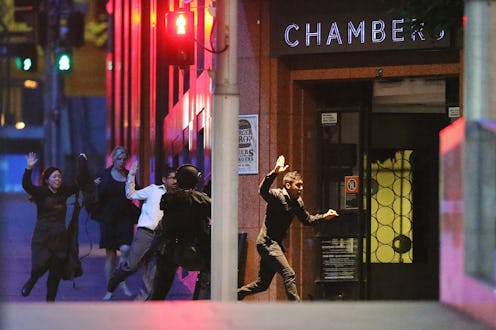News
How Aussies Just Won on Twitter
After a terrifying standoff, the Sydney hostage crisis is over, with two hostages reported dead and the remaining captives freed, after police stormed the Lindt Chocolate Cafe on Monday. But the emotional aftermath that follows a terrorist attack is only just beginning. The crime was swiftly linked to Islamist fundamentalism after the perpetrator, Man Haron Monis, hung a black Islamic flag in the cafe window.
Monis is a self-proclaimed sheikh who has been accused of numerous sexual assaults on women, and is awaiting trial for being an accessory to murder. Anticipating a backlash, Muslim leaders from around the world signed a press release condemning terrorism and violence in any form, and expressing their "utter shock and horror at the unprecedented scenes emerging from the Lindt cafe in Martin Place."
On social media, Australians have been responding to the crisis with the calmness and "mateship" that Aussies are well known for, showing the world that they won't be made fearful or hateful by acts of terror. This kind of positive activism is vitally important, especially given the Islamophobic reactions that have emerged in response to terrorism before: As law professor Khaled Bey wrote on Twitter, "An #illridewithyou initiative in the US after 9/11 would've prevented considerable racial violence and injury."
The social media trends below reveal just how many Australians have been galvanized into solidarity and community action following this crisis. We could all probably learn a thing or two from their social media response.
"Terrorism Will Never Work In Australia"
Sydney resident Jason Maggs shared this powerful story about his commute home, and it has since gone viral and been shared over 16,000 times. He declared that "terrorism will never work in Australia" since Australia is a "nation of mates" and the attack had only "galvanized our mateship."
#I'll Ride With You
The tweets using the hashtag #IllRideWithYou beautifully illustrate Maggs's point about mateship. Thousands of Australians used the hashtag to offer companionship to Muslim Australians who might feel unsafe following the siege. The hashtag has been astonishingly successful, retweeted over 100,000 times within the last twelve hours.
Rachael Jacobs started the movement by posting on Facebook about her response to a Muslim woman whom she saw remove her hijab on a train. She ran after the woman and offered to walk with her so that she could feel safe wearing her headscarf. The woman apparently hugged her and was moved to tears by the gesture.
A reporter living in Sydney, Tessa Kum, saw Jacobs' posts and came up with the hashtag:
Over 100,000 people have since tweeted using the hashtag, offering rides and companionship to Muslims across Sydney and the world:
Some also pointed out how the hashtag campaign helps fight violence and terrorism:
And others used the hashtag to illustrate a larger point:
"How Do You Sleep At Night?"
When the conservative tabloid The Daily Telegraph released their incendiary front page, Australians took to social media to condemn the irresponsible coverage:
Many people posted negative comments on the Daily Telegraph's Facebook page. "As individual human beings who make the calls to run headlines like the one that appears on your 2pm edition, how do you sleep at night?" asks Facebook user Jez Coombs. Another user, Sarah Portwine, blasted the inflammatory, inaccurate phrase "death cult" and the tasteless publication of hostages faces while they were still being held prisoner.
Others shared their disgust with the cover story on Twitter:
These gestures of solidarity and anti-Islamophobia are a small good thing to come out of this horrific act of terrorism. It's great to live in a world in which so many people respond to violence with kindness and love, but terrible to live in one in which it's necessary.
